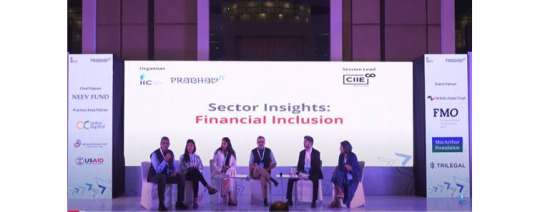Text
Watch the Videos of Aavishkaar Group Leadership at Impact Investor’s Council “Prabhav 2022”
Impact Investors Council hosted the fourth edition of Prabhav on the 12th and 13th of September in New Delhi. More than 650+ delegates and 140+ speakers across 15 countries graced Prabhav, including over 30 global impact investors.
Aavishkaar Group, a founding member of Impact Investors Council, was well represented by Sushma Kaushik, Partner, Aavishkaar Capital & Sowmya Suryanarayanan, Director- Impact and ESG, Aavishkaar Capital who spoke at the Summit while Amar Gokhale, Associate Director- Gender & Livelihoods, Intellecap, and Sanchayan Chakravorty, Partner, Aavishkaar Capital moderated key sessions at the Summit.

Equity For Impact | Sector Insights: Financial Inclusion
Financial Inclusion has been the traditional mainstay of India’s impact investing ecosystem, attracting almost half the entire equity capital flowing into Indian impact enterprises since 2017. This panel explored how India’s financial inclusion landscape has evolved over the years and highlighted the tech-driven innovative business models propelling this sector into the future.
Speakers: Ajaita Shah, Founder And CEO, Frontier Markets – Anirudh Sarda, Head of Equity Investments (Asia), Oikocredit – Jyotsna Krishnan, Managing Partner, Elevar Equity – Sanjay Jain, Chief Innovation Officer, CIIE.CO – Shashaank Awasthi, India Advisor, Gray Ghost Ventures, Sushma Kaushik, Partner, Aavishkaar Capital
Read More:- https://aavishkaarcapital.in/news/watch-the-videos-of-aavishkaar-group-leadership-at-impact-investors-council-prabhav-2022/
0 notes
Text
Grain as an asset and currency: Aavishkaar Capital Investee Ergos featured in Forbes India

Mumbai, 9th Sep: Aavishkaar Capital Investee, grain bank startup, Ergos was featured in Forbes India in a story titled ‘Ergos: Grain as an asset and currency” which highlighted the journey of Ergos in converting farmers harvest into a collateral which can be used to access finance. Ergos today operates out of 250 locations and works with 1, 50,000 farmers and 1,100 traders.
Ten years ago, Kishor Jha and Praveen Kumar decided to put their banking and corporate experience to use in the farming sector. Both came from a farming family background and had seen the problems faced by farmers when it came to selling their grain and raising working capital. Most marginal farmers—which form about 80 percent of the community—rush to sell foodgrain immediately after harvest to repay the money they would have borrowed from a moneylender, typically at a high interest rate.
“When the grain is ready, more than 80 to 90 percent farmers end up selling everything within 30 to 40 days,” says Jha on a call from Bengaluru. Even if they are not in debt, there is no place where they can store their grain since most commercial warehouses are not at village locations, but are situated closer to consumption centres. Jha and Kumar wanted to turn that grain into collateral, an asset that small farmers could pledge with a bank and access finance at a lower rate, as well as sell over a period of time according to their cash flow needs.
So they leased a warehouse in Bihar and asked small farmers to deposit their grain with them. After checking the quality of the grain, just like a bank, they issued a khata book and made entries in the passbook. Their startup, Ergos, founded in 2012, made the warehouse a grain bank, and grain a farmer’s currency.
And while a buyer might not go around buying 10 to 20 bags each from several farmers, integrating the stock meant a buyer could even buy a 100,000 bags belonging to several farmers from an area. “That’s the model that actually unlocks the value of selling even one bag to a buyer,” says Jha, founder and CEO of Ergos.
Read More :- https://aavishkaarcapital.in/news/grain-as-an-asset-and-currency-aavishkaar-capital-investee-ergos-featured-in-forbes-india/
0 notes
Text
India’s time to lead collective action on ESG by Abhishek Mittal, Partner, Aavishkaar Capital
Mumbai, 30th Sep: Read the blog, “India’s time to lead collective action on ESG” by Abhishek Mittal, Partner, Aavishkaar Capital.
Featured on Times of India, the blog talks about the three priority areas India should drive conversations around, when it assumes the Presidency of the G20 for a year starting this December till the end of November 2023.
Early last month, Abhishek Mittal had attended the G20 Digital Innovation Network (G20 DIN) as part of MeitY’s delegation in Bali, Indonesia representing Indian VCs as part of Indian Venture & Alternate Capital Association (IVCA).
India will assume the Presidency of the G20 for a year starting from this December till the end of November 2023. As we look to firm up our priorities for G20, India should drive conversation around three priority areas where she has had varying degrees of success — women empowerment, circular economy, and innovative financing. A dialogue around these can enable concrete policy-making to deliver on the global goal of inclusive, equitable and sustainable growth.
Women & Sustainable Development
India has the potential to propel world economic growth for the next few decades. But that promise would come undone if we do not invest to empower our 700 million women to contribute to our economy in a productive manner. We have today more women in senior management than the world average but a lot more can be done. Private sector interventions such as microfinance have done a tremendous job in pushing women entrepreneurship. But to achieve full gender parity, we need a global agenda, addressing all aspects of women’s lives with systemic and cross-cutting policies. Comprehensive and early interventions such as bettering health outcomes, improving STEM, digital and financial literacy can reduce or eliminate the future gender gap. Innovation in technology has reduced the costs for delivering such outcomes and we should find ways to provide financial and ecosystem support to entrepreneurs devising innovative solutions to achieve such outcomes. . Forums such as the G20 can help generate governmental and multilateral support for such initiatives and help translate success stories to other frontier markets.
Read More :- https://aavishkaarcapital.in/news/indias-time-to-lead-collective-action-on-esg-by-abhishek-mittal-partner-aavishkaar-capital/
0 notes
Text
1 note
·
View note
Text
How Indian Startups can stay ahead of the curve With ESG Goals

How Indian Startups can stay ahead of the curve With ESG Goals by Sowmya Suranarayanana, Director – Impact & ESG, Aavishkaar Capital.
There has been a sharp focus on Environmental Social Governance (ESG) aspects among stakeholders, including the investor community, who have become increasingly aware of the need to integrate ESG within their businesses and portfolio companies. This awareness has come in the context of several global events — a raging pandemic, and the worsening climate crisis, among others. This has brought into focus the tremendous strain and negative impact on global value chains. Furthermore, the lack of understanding of the intricate interconnections of the social and environmental fabric that binds the world has been brought to light.
The key question, then, is how can large organisations transition from good intentions to an action-oriented approach to well-integrated ESG systems within their business to mitigate and prevent harm to the community? More importantly, how can ESG be extended to their global supply chains, which include mid-market companies, in order to generate long-term benefits for organisations, customers, employees, investors, and the environment as a whole?
ESG Requires An Ecosystem-Based Approach
To put this into perspective, there are two major developments in the sustainable finance space that are heavily influenced by ESG. For starters, institutional investors’ approach to incorporating ESG into their investments has evolved, and the push is stronger than ever. According to Bloomberg Intelligence, global ESG assets under management (AUM) are expected to reach $53 Tn by 2025, accounting for nearly a third of the global AUM.
Investors are increasingly looking at ESG assessment as a tool for creating value for their portfolio’s long-term sustainable growth, both financially and in terms of positive environmental and social impact. Just last year, the number of new signatories to the Principles for Responsible Investment (PRI) increased by 42% over the previous year, bringing the total number of current signatories close to 4,000. This indicates a strong commitment from investment managers to integrate ESG within their investment process.
Second, large organizations around the world are rethinking current processes and actively working to incorporate environmental, social, and governance considerations into their functions. This step toward building resilient businesses has received significant support from both the government and investors. This will help companies in not only improving operational efficiencies, but also enabling diversity and inclusion policies and delivering on sustainable products and services.
Read more:- https://aavishkaarcapital.in/news/how-indian-startups-can-stay-ahead-of-the-curve-with-esg-goals-article-by-sowmya-suryanarayanan-director-impact-esg-aavishkaar-capital-featured-on-inc42/
0 notes
Text
0 notes
Text
Using Climate Tech for Achieving Net Zero & Resilience - Aavishkaar Capital
Mumbai, 14th Sept: The Impact Investing Handbook 2022 is a multidimensional view on enabling social impact. This 144 page handbook provides a comprehensive guidance on the landscape of Impact Investing in India and positions impact investing as a multi-faceted approach to catalyzing different scales of social impact in India and brings in analytical insights on key market trends and investment opportunities through seven focus areas: Equity Impact Investing, Debt Impact Investing, Gender-Lens Investing, Climate-tech Investing, Blended Finance, Sourcing of Capital for Impact and Policy & Regulations.
The Handbook, a pioneering initiative by Impact Investors Council (IIC) in collaboration with The British Asian Trust was launched at ‘Prabhav 2022’ in New Delhi. Aavishkaar Capital
The article, Using Climate Tech for Achieving Net Zero & Resilience has been exclusively written for the handbook by Sanchayan Chakraborty, Partner, Aavishkaar Capital and Santosh Singh, MD, Intellecap, under Climate-tech investing and as part of the ‘Voices of Industry’ section of the handbook.
Climate change is already resulting in, and is projected to increasingly cause, huge disruptions on economic activities, ecological systems and societal wellbeing. To mitigate the worst climate impacts, greenhouse gas emissions must be halved by 2030 and reach ‘Net-zero’ by 2050 from current levels according to the Intergovernmental Panel on Climate Change. This recognition has led to increased focus by both countries and corporations, on mitigation of climate risks and adaptation towards climate change. Globally, 77 parties representing 84 countries have pledged a net zero target covering 73% of global GHG emissions as per Climate Watch’s Net-Zero Tracker. In addition, 5000+ businesses have announced their own net-zero commitments under the UN’s Race to Zero campaign. Fulfillment of these climate commitments, encompassing both reduction of emissions and improving resilience to climate change, will require wide-ranging investments in climate technology development, building of green and climate smart infrastructure and transformation of business processes.

The imperative of climate change mitigation has been highlighted by UNFCC for over 4 decades. Multilateral climate talks led to the Kyoto Protocol in 1997 (effective from 2005), under which 37 developed countries made commitments to reduce their emissions, developed methodologies for measurement of emissions and offsets, thereby paving the way for the first national and regional markets for carbon credits. Significant venture capital investments (more than US$ 25 bn) were also made in climate technologies between 2006 and 2011, mostly in clean energy technologies in solar and wind, which were seen to be the priorities at that time. However, limited participation in the global GHG reduction commitments (none by developing nations) and shifting strategic priorities of obligated countries led to continued lack of progress in global climate talks. Global carbon markets eventually collapsed by 2012 and economic incentives for climate tech development reduced, resulting in many of the ventures losing money.
1 note
·
View note